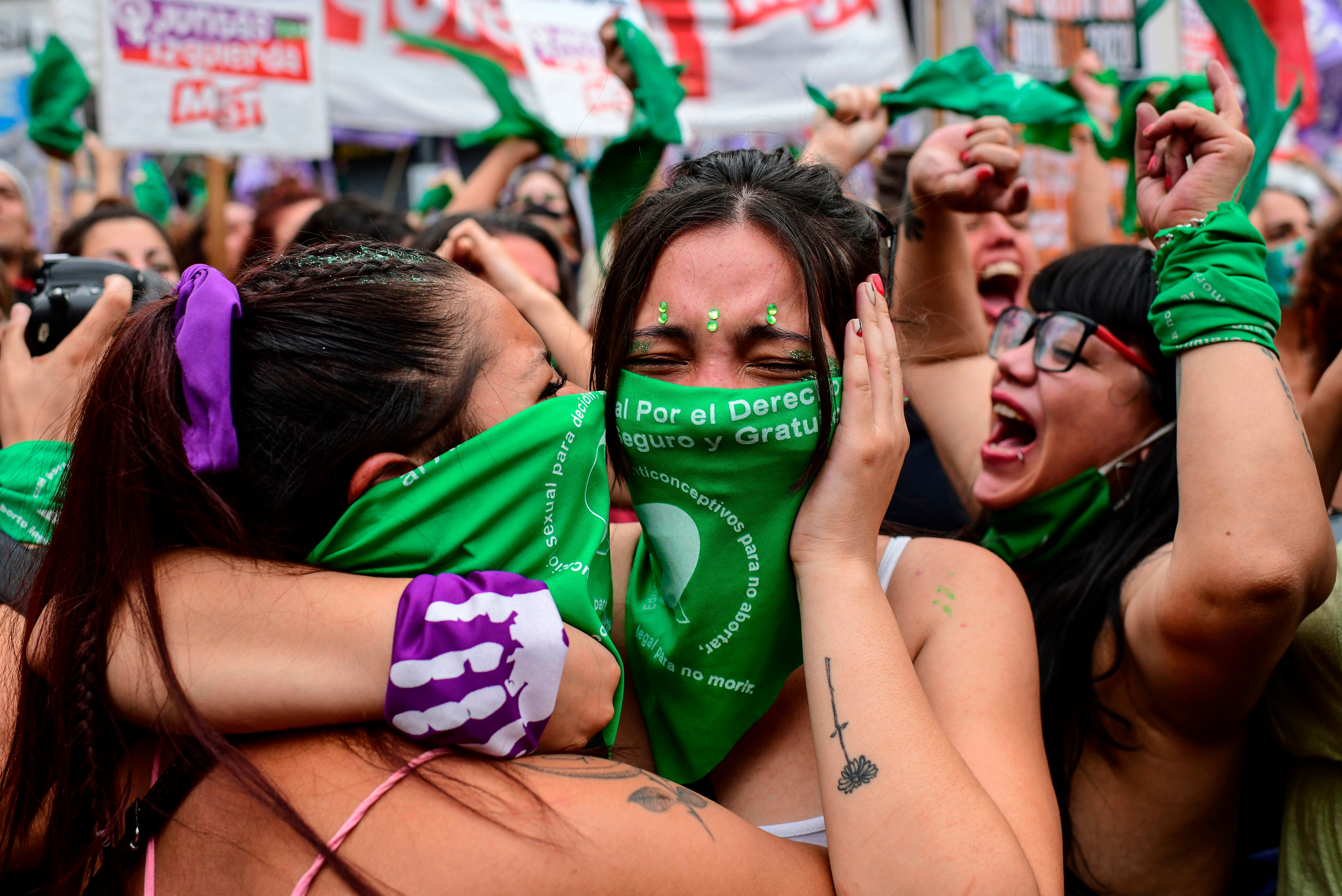Landmark bill legalising abortion passes Argentina’s lower house
Current laws mean abortions only allowed if pregnancy is due to rape or in instances when mother’s health or life is in danger

Your support helps us to tell the story
From reproductive rights to climate change to Big Tech, The Independent is on the ground when the story is developing. Whether it's investigating the financials of Elon Musk's pro-Trump PAC or producing our latest documentary, 'The A Word', which shines a light on the American women fighting for reproductive rights, we know how important it is to parse out the facts from the messaging.
At such a critical moment in US history, we need reporters on the ground. Your donation allows us to keep sending journalists to speak to both sides of the story.
The Independent is trusted by Americans across the entire political spectrum. And unlike many other quality news outlets, we choose not to lock Americans out of our reporting and analysis with paywalls. We believe quality journalism should be available to everyone, paid for by those who can afford it.
Your support makes all the difference.Argentinian politicians have passed a bill which overhauls the country’s highly restrictive abortion laws and allows women to legally have a pregnancy terminated in the majority of instances.
The legislation, which permits women to have an abortion up to the 14th week of their pregnancy, still needs to be voted on by the Latin American country’s Senate – with the verdict expected before the end of the year.
Current laws mean abortions are only allowed if the pregnancy is due to rape or in instances when the mother’s health or life is in danger.
The debate on the legislation in the lower house of the congress stretched from Thursday into the early hours of Friday due to abortion being a massively divisive issue in the predominantly Roman Catholic country. The bill passed by 131 to 117 votes with six lawmakers choosing to refrain from voting.
Campaigners warn the current law on abortion is not consistently implemented in Argentina and abortions are routinely unavailable even when women are legally entitled to access them.
Alberto Fernandez, the Argentinian president who supports abortion rights, has said the new legislation would ultimately save lives, as more than 38,000 women are forced to go to hospital each year after illegal abortions go wrong and more than 3,000 have died since 1983.
Abortion rights campaigners gathered outside the congress building all night in the Argentinian capital of Buenos Aires – weeping and hugging each other when news of the vote emerged.
Paula Avila-Guillen, executive director of the Women’s Equality Centre, told The Independent: “After this massive approval in the house, Argentina is one step closer to solidifying as a leader in fully recognising women’s rights.
“It is now time for the senate to pass this bill and choose to be on the right side of history by guaranteeing the health care rights for the over 22 million women in Argentina.
“We have long known that archaic abortion laws are not deterrents, they only lead to unsafe clandestine abortions that threaten the health and lives of the most vulnerable women and girls. By passing this historic bill, the Argentinian senate will be saving countless lives.”
Earlier in the week, a doctor who provides abortions in Argentina told The Independent she has witnessed women arrive at the health centre in desperate situations after having to resort to unsafe backstreet abortions.
Dr Betiana Olearo, who works in Cordoba in central Argentina, said: “I remember a woman dying in a health centre I was working in because of having a clandestine abortion. This was impactful. Not just for her family. But for her community. She left behind four children. They remained alone after she died.”
Her comments came as Argentinian healthcare professionals condemned the decision to refuse a 12-year-old girl an abortion who was pregnant with twins due to allegedly being raped. The girl, who has not been named, lives near San Salvador in the far northwestern Argentinian province of Jujuy.
Mr Fernandez pledged to introduce legislation which makes abortion legal during his first annual address to congress. The president, who was sworn in at the end of last year, argued the current law had “condemned many women, generally of limited resources, to resort to abortive practices in absolute secrecy, putting their health and sometimes their lives at risk”.
He said: “Abortion happens, it’s a fact. A state should protect citizens in general and women in particular. And in the 21st century, every society needs to respect the individual choice of its members to decide freely about their bodies.”
A bill legalising abortion in Argentina was rejected by a close margin by Argentina’s senate after getting the approval of the country’s congress back in 2018.
Ahead of Friday’s verdict, Mariela Belski, executive director of Amnesty International Argentina, told The Independent: “The legalisation of abortion in Argentina could act as an expansive wave that impacts on the expansion of women’s rights throughout the region.
“Historically, it has had and has a strong role in setting the regional agenda with laws that expand rights. It is a very influential country.”
She noted Latin America is the only part of the world where teen and child pregnancies and births are actually rising – adding that this is due to high rates of sexual violence, and a dearth of access to reproductive health services, such as emergency oral contraception and the safe and legal freedom to have an abortion.
A recent report by Argentina’s Access to Safe Abortion Network found more than 7,000 girls aged between 10 and 14 in Argentina delivered babies from 2016 to 2018, with the pregnancies often the byproduct of rape.


Join our commenting forum
Join thought-provoking conversations, follow other Independent readers and see their replies
Comments